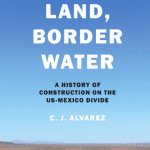Though the authors of The Shock of the Anthropocene apply their skills as historians of science throughout, the book is far more than a straightforward history. Written at the intersection of science, history, and the broader humanities, Bonneuil and Fressoz provide well-reasoned and well-founded arguments that surgically take apart the dominant view of the Anthropocene as an epoch of human-provoked environmental crises that have only recently come to our attention, and for which scientific advances and sustainability-oriented mindsets are the only solution.
The book is divided into three parts, each oriented toward a particular goal. The first part introduces the scientific data on greenhouse gas emissions, biosphere degradation, changing biogeochemical cycles, and energy mobilization upon which the definition of the Anthropocene rely. Fressoz and Bonneuil show how the distinction between the realms of nature and culture—think, for example, of the opposition that emerges in Europeans’ quests to conquer the wilderness of the New World and impose their ways onto “savage” and “uncultured” natives in the fifteenth and sixteenth centuries—is no longer so clear-cut, and how placing the blame for the environmental crises of the Anthropocene on an ambiguous human whole can propagate a hegemonic narrative. These observations set up part two of the book, in which the authors reintroduce the political and break down the hegemonic qualities of the Anthropocene discourse. They show the ways in which scientific research has helped produce an undifferentiated and distanced view of the Earth and the anthropos that minimizes the key role of major nation-states in the development of today’s environmental crises, and the dangers of designating the scientist as the ultimate hero of the epoch. This completes the foundation for part three, a collection of seven histories that expose the imprecision inherent in the concept of the Anthropocene by focusing on one aspect of its development. For example, in their history of energy—the Thermocene, as they call it—the authors note how the dominant account, which asserts that the transitions from wood to coal to oil have been driven by a search for efficiency, obfuscates responsibility for the negative consequences of these decisions. Bonneuil and Fressoz demonstrate instead that the history of energy is one of successive additions (i.e. wood and coal and oil) shaped by political, military, and ideological decisions that have often gone against principles of efficiency and technological progress. The authors close this history by addressing the political on a global level, highlighting the key role of Anglophone countries such as the United States and Great Britain in the technological changes and environmental consequences of the Thermocene.
This publication is of great merit. The sheer breadth of knowledge on which the authors rely is a wonderful example of interdisciplinary research, and the clarity with which they synthesize and present the information is impressive, to say the least. However, this feat produces a dense text that limits its potential readership. The section “The discourse of a new geopower,” for example, is crucial to the transition between Part Two and Part Three because it reveals how the current “authorized narrative” of the Anthropocene represents, reproduces, and supports certain hegemonies on a global scale. But in order to follow the thread of this chapter, the reader must contend with Michel Foucault’s notion of biopower, Peder Anker’s imperial ecology, and Vladimir Vernadsky’s biosphere, all introduced in the span of three pages. These concepts are explained briefly and cited appropriately, but their complexity prohibits this book from being a leisurely read for those who are not already familiar with the ideas. These shortcomings aside, The Shock of the Anthropocene is a welcome and necessary read for scholars of any field concerned with the status of the concept of the Anthropocene.
Other Articles You Might Like:
City in a Garden: Environmental Transformations and Racial Justice in Twentieth-Century Austin, Texas
Her Program’s Progress
Boomtown, USA: An Historical Look at Fracking




